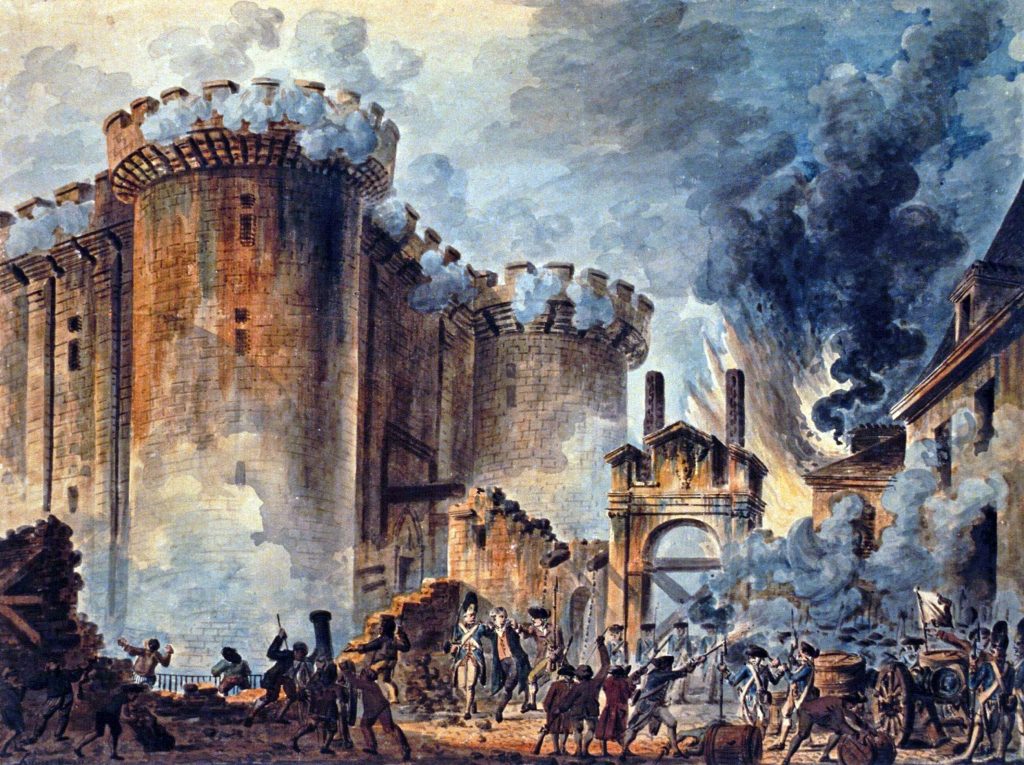Reformation in France Severely Discouraged
Because the Reformation had been severely discouraged in France, Bibles in French were rare, and the common people continued for the most part in ignorance of the Scripture.
The war against the Reformation was begun anew in France in 1685 when Louis XVI’s great-grandfather, Louis XIV, the Sun King, revoked the Edict of Nantes which guaranteed certain rights to the Protestants, and made Protestantism illegal. Some of the most learned and industrious men of French society had become Protestants, and they were persecuted so fiercely, that France bled its best and brightest to other countries whence they fled, or consigned them to tortures and dungeons until death claimed them.
See Wikipedia, “Edict of Nantes,” <http://en.wikipedia.org/wiki/Edict_of_Nantes>.
“The edicts of the king [Louis XIV] threatened books as well as persons with extermination. The Archbishop of Paris had compiled a list of works which the faithful could not read but at the risk of deadly injury. With this list in his hand the officer entered every suspected house, and whenever he found a forbidden book, he instantly destroyed it. … The records of Synods, and the private papers and books of pastors, were the first to be destroyed. Wherever a Bible was found, it was straightway given to the flames.”
J. A. Wylie, The History of Protestantism, Book 22: Protestantism in France From the Death of Henry IV (1610) to the Revolution (1789), Ch. 6, “The Prisons and the Galleys.”
The entire twenty-second volume of Wylie’s History is recommended for anyone wishing to dig deeper into the spiritual life of France preceding the Revolution.
France’s Rejection of Both God and Faith
In France, the leaders advocating for reform saw the corruption of the clergy around them, and the tyranny of the Catholic nobility, and rejected both God and faith as a result.
“It is to be remembered, however, that this was a revolt against the Roman Catholic departure from the true faith, for the Papacy was the only religion they knew. This revolt was therefore against the caricature rather than against the genuine.”
Leroy Froom, Prophetic Faith of Our Fathers, Vol. 2, pp. 738-39.
The Storming of the Bastille
Next the Parisian mob stormed the Royal Armory of the Bastille …
“The Bastille not only overshadowed the capital, but it darkened the hearts of men, for it had been notorious for centuries as the instrument and the emblem of tyranny. The captives behind its bars were few and uninteresting; but the wide world knew the horror of its history, the blighted lives, the ruined families, the three thousand dishonoured graves within the precincts, and the common voice called for its destruction as the sign of deliverance. At the elections both nobles and commons demanded that it should be levelled with the ground.”
John Emerich Edward Dalberg, Lord Acton, Lectures on the French Revolution, p. 73.
The storming of the Bastille took place on July 14, 1789, and is still celebrated in France as the national Day of Independence.
Insightful Links:
- Solzhenitsyn Mourned Bastille Day. So Should All Christians. – John Zmirak

Extreme Poverty of the French Peasantry
The situation in France at the time of the American Revolution, then, was … increasing and extreme poverty of the middle and lower classes, under the burden of taxation which provided the funds for the nobility and clergy to live to excess.
“The peasantry, on the other hand, were the burdened class. … The Church added her claims—her tithes … and the endless fees and money payments, which made her so obnoxious. Bishops and abbots, in France as in Germany, had large estates as well as tithes, and so were landlords and princes, as well as priests, drawing, Machiavelli says, two-fifths of the annual revenues of the kingdom into their ecclesiastical coffers. … ‘During the past thirty-four years [royal] troops have been ever passing through France and living on the poor people. When the poor man has managed, by the sale of the coat on his back, after hard toil, to pay his taille, and hopes he may live out the year on the little he has left, then come fresh troops to his cottage, eating him up. In Normandy multitudes have died of hunger. From want of beasts men and women have to yoke themselves to the carts, and others, fearing that if seen in the daytime they will be seized for not having paid their taille, are compelled to work at night. The king should have pity on his poor people, and relieve them from the said tailles and charges.’ … When to all this we add the consciousness that while they, the much-enduring peasantry, were bearing their increasing burdens, the noblesse were free from them, can we wonder if the peasantry should learn to hate as well as envy the nobles?”
Frederic Seebohm, The Era of the Protestant Revolution, pp. 45-47.